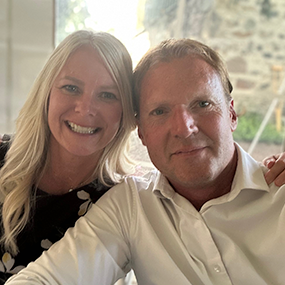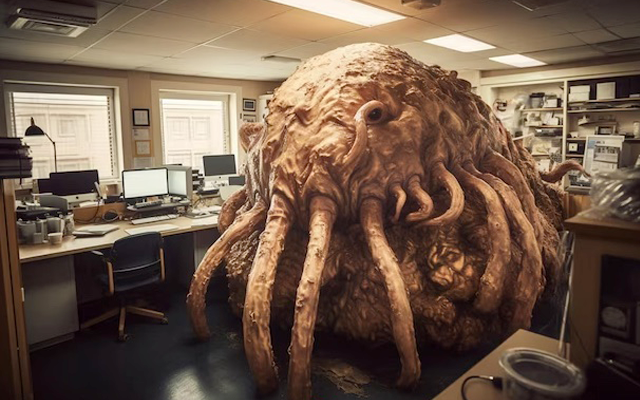The e-Myth – by Michael E. Gerber is a fantastic book famously outlines this concept: “You need to work ON the business, not IN the business”. Another common way to say this is – “you need to get out of the weeds”.
While I would agree 100% with this concept, at times you need to get deep in the weeds – for a while – in order to understand it. And if you understand it, you can manage it.
As COVID was starting to trail off, we realized that the our Operations Team had over-purchased inventory to a catastrophic level. We were not alone – other companies had too, but in our case we purchased enough to support a company 5x our sales. It put us to the brink of collapse. You can imagine the warehousing costs were crippling.
To make matters worse, most of the inventory was the wrong, slow moving inventory. Furthermore no-one knew what inventory was still en route from overseas. It was a perfect storm of all things awful.
The main cause of this situation happening? A whole bunch of things. Bad management (myself to blame), lack of systems, lack of oversight and accountability, and lack communication with other teams. It was a disaster.
But the point of this story is how we turned Operations around in 9 months and give us a second chance.
After some difficult personnel decisions, a few weeks later the rest of the Operations team left the company. I don’t blame them – it was very ugly and dire, and they rightly had zero faith in leadership at the time. That left only me to run all things Operations.
I hadn’t a clue about Operations – in fact I was called out by one of my employees in Operations as ‘Eddie has no Operational experience, he doesn’t know what he’s doing?’. He was 100% right – I didn’t have a flying clue. But every complex problem can be figured out with simple practicality, common sense and a pragmatic mind. A fresh set of eyes.
I approached the challenge from the ground level. There was EDI connections and EDI codes I knew nothing about. There was a mess of millions of dollars of mostly wrong inventory scattered over 4 different warehouses in North America. There was mismatched boxes, a colossal amount of wrong inventory.
At the very same time I was attending meetings with bankruptcy trustees with my wife. We didn’t know if in 6 months we’d have a home to live in. It was awful. I hardly slept. I lost 20 lbs. Many times I went home and found myself sobbing and kneeling at the couch.
I went for consistent nightly Beach Glass walks with my wife to keep my mind off the misery. I worked hard to avoid falling into the trap of numbing my brain with alcohol.
But one step at a time, I approached every critical component of the Operations as a Grade 1 student, and with a creative mind. I asked all the stupid questions: “Why do we do this, why do we do that, what does this mean, why has this been the practise?”
I got deep into the weeds in order to understand the process. I did manual order entry. I did manual inventory updates, I learned how to fix broken Excel macros, I learned how to run reports in our ERP, I build a complex spreadsheet to simply sort out and plan how long inventory was going to last us. I figured out how to manage incoming containers. I built SOPs. I designed systems. I used my resources around me. I re-established communication with other teams.
I soon needed someone much smarter than me to carry out my systems vision. I then hired a Systems Specialist at the beginning of 2023 – and he has been critical for taking my vision for systems and doing all of the behind the scenes work.
If it weren’t for the old team completely leaving me, I would never have had the chance to understand the department at such a deep level. I also would never of had the confidence to know what this business needs, and to fight for it.
The point is this: You simply can’t manage something you don’t understand. Because I was part of this massive turnaround – I know exactly what I want, what it takes. I won’t settle for anything less.
“You can’t manage something that you don’t understand.”
Because I know what is required for this department to run properly, i have high standards. My new team is allowed to put their spin on the process but at the end of the day – this confidence I have in knowing the system that works, and what doesn’t work – helps me provide complete clarity to the new team.
And knowing what you want, and knowing what is required makes it very easy to continue clarify the standards and practises that the company and the team needs to work well together. It enables you to have the confidence to have difficult conversations, demand excellence and know – without wavering – what is required.
It’s terrifying to get deep into the weeds. It’s very humbling. You make yourself vulnerable. Your team will see you for who you really are. And you’ll likely find out that they’re smarter than you in many areas. But that is OK. You need to understand something at a deep level in order to relate, to manage and to direct it properly.
Get yourself into the weeds – not forever, but give yourself this privilege.
Are you brave enough?
Eddie


 Great to meet you, my name is Eddie.
I have been in small business for over 30 years. I have started companies doing business with some of the world's most famous brands.
I've been at the brink of bankruptcy.
I have stories to share. Enjoy.
Great to meet you, my name is Eddie.
I have been in small business for over 30 years. I have started companies doing business with some of the world's most famous brands.
I've been at the brink of bankruptcy.
I have stories to share. Enjoy.


Leave a Comment